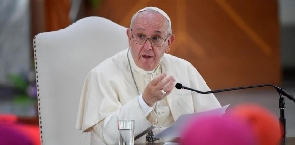AKUFO ADDO’S NPP LIES ARE SUFFERING FROM THE DISEASE ELEPHANTIASIS--NO WONDER THEY ARE ELEPHANTS ECONOMIC & POLITICAL FOCUS
PART ONEWhen I think about how much the NPP is shamelessly prepared to deceive the hardworking people of Ghana and the form such lies take, I’m reminded of the disease Elephantiasis which causes “gross enlargement of the limb”. You know elephantiasis actually swells the skin--causing it to embarrassingly overgrow quite abnormally. The lies of the NPP have in reality taken such abnormal forms: growing by day and enlarging the level of embarrassment this causes the ordinary Ghanaian as socio-economic living conditions never see any real improvement. I then wonder if this NPP “lying” disease is as a result of their status as the only major wild animals (Elephants) to have chosen to dwell alongside humans. Let me give you reasons behind my diagnosis.
Alarmed at the ill-conceived NPP policy of committing a whopping $120 million (US Dollars) to an unsustainable National Youth Employment Programme (NYEP) launched by the President under fun fair in October 2006, I confronted the Hon. Minister of Finance Kwadzo Baah-Wiredu on London’s Hot FM during a couple of minor phone-in debates between late 2006 and mid 2007. In my various submissions on air, I clearly put it to the Finance Minister that the NYEP was unsustainable because the money for the Programme was a one-off budgetary allocation and that his Government would soon need to raise taxes or generate some other revenue to make the programme a permanent one. I also predicted that looking at conditions at the time and the constraint on public finances, the National Youth Employment Programme was bound to run into financial difficulties.
I further demanded from the Finance Minister to confirm if this Programme was a temporary NPP vote buying policy or an appeasement for their failed promises of job creation in the 2000 NPP Manisfesto. The Minister deliberately dodged my concerns. Each time, he found it more convenient to launch ferocious attacks on the human rights records of the PNDC and NDC and ended up providing no answers at all. That was no big surprise to discerning listeners because his ranting was in line with the usual NPP scare-mongering given that he was speaking to the mostly Ghanaian middle class human rights and security conscious audience on a London Radio. According to the Ghana government website ghana.gov.gh on the 3rd of October 2007, four months after my initial radio encounters with the Finance Minister and exactly a year after its launch, the National Youth Employment Programme eventually ran into the financial difficulties I predicted, threatening to render the Programme a short-lived one. In an apparent haste to save his face and that of the government, the Minister announced in his 2008 budget published on the 15th of Nov. 2007 that he would raise more money to pay for the NYEP by imposing more tax on the ordinary Ghanaian phone user. Paying for the NYEP would now be done through the new Air Time Tax which has just been passed by the NPP dominated Paliament--evidence that the NYEP was not well planned. Does anyone go to the market without money to pay for what he wants to buy? Only NPP does. The opposition NDC opposes such an insensitive tax on the good people of Ghana and thereby voted against the new Law. I still think the National Youth Employment Programme in its current form will prove difficult for NPP and even future governments to sustain financially. My analyses of statistics from the Ghana Statistical Service indicate that in the next couple of decades, more and more Ghanaian youths will be entering the job market in search of jobs. It is still unclear how much the new Air Time Tax will be able raise for the national coffers and how many people it can pay to remain in those artificially created public sector jobs. Given that the NYEP only pays allowances to its employees—money which is not taxable because it is neither enough salary nor gift coupled with the fact that even if it was one of these or is classified as such in the future, it is unlikely to cross the annual threshold of income taxable by government. The fact that most of the jobs involved were created out of necessity rather than sectoral or industrial demand means that the economic case for the permanency of the NYEP is weak. The NPP has just begun distributing money to poor people in a policy programme called Livelihood Empowerment Against Poverty (LEAP), a potentially helpful policy but ill-judged and badly planned too, reminiscent of how they introduced the NYEP. I am still studying this new policy called LEAP and will address that in due course.
I beg to maintain that there is the need to review the NYEP. I am aware, courtesy of a February 2008 GNA news report that Nana Akomea, the current Employment Minister finally saw reason in what critics of the Programme like myself have been saying since the announcement of this half-baked, artificial employment policy. The policy itself is detached from Ghana’s economic model as well as against the NPP’s Manifesto promise of creating Jobs through the private sector. They never told us they were going to tax Ghanaians more to pay people enrolled on politically motivated social jobs. This reckless mismanagement of the economy increases the number of people on government payroll albeit indirectly, as well as the burden on public finances and expenditure. What then should be done? As an NDC member, I believe the next NDC government to be led by Prof. Atta Mills has a track record in delivering good value for money. I will actually urge the next NDC Government to carry out much needed reform in this area of National Youth Employment. First, I will advise that Government expenditure on education is significantly reviewed to achieve maximum cost savings for better investment into science, mathematics, ICT and vocational education. This must be followed by serious investments in teacher education focusing on science and technology. Second, the NYEP should be reviewed and the modules whittled down to meet the demands of Ghana’s economy for instance, sustainable agriculture for food security. The rest of the job modules that are insignificant to the Ghanaian economy like the unconstitutional community protection “police” must be abolished and the money channelled into training people in nationally recognized new technological education, vocational skills and entrepreneurship. There is the possibility that by identifying the types of business ventures with the highest likelihood of success and subsequently investing in them, such training could be followed by small pilot projects in the form of public-private work and training ventures. This small cohort approach will ensure that public money is well spent. It also means that there must be real investments in the physical infrastructure of vocational and technical institutions and a pragmatic new national policy on technological and vocational skills education running into the next decade. It will have to be done by giving up the NPP’s politically expedient habit of US style pork barrel spending on political pet projects. Profit making private companies (major ones) could be supported and incentivized to partner the government in the delivery of some of these new policies of technological education, vocational skills and entrepreneurship training. This will go a long way to develop a skilled workforce and foster the spirit of entrepreneurism.
GNA reported the Finance Minister’s observation on 18th July 2007 that Ghana spent 9.5 trillion old Ghana cedis (about one billion US dollars) on tertiary education alone in 2006/2007. That according to him represented 45% of the total education budget, meaning the annual education budget is well over $2 billion. In spite of this enormous growth in the amount of money government spends on education every year, one would have expected the NPP to build more Polytechnics and Universities or at least significantly expand the existing ones to meet the common aspiration of Ghanaian Youths. Instead, enrolment at the universities has peaked while available classroom, library and accommodation facilities are over-stretched more than ever. The NPP boasts of this increase in enrolment figures as a sign of life in our educational system even without taking note of their failure to adequately invest in modern physical infrastructure. The NPP is in its eighth year of government but no single new Polytechnic has been built. Apart from granting the University of Mines at Tarkwa autonomy from the Kwame Nkrumah University of Science and Technology and the upgrading of the Ghana Telecom Training Centre which were all functioning institutions under the NDC anyway, the NPP has not yet built any new University. Considering the huge amount of money the Finance Minister claimed they spend on education: on average $2 billion (US Dollars) a year or take my conservative estimate—which is north of $10 billion (US Dollars) over the past seven years since they came to power--how come physical development in the skills training and higher education sector remains abysmally low? Where are all these monies going to?
The sheer amount of Ghana’s education spending which is just over 20% of the total budget every year and the disproportionately inadequate infrastructural development threatens the future of education in Ghana. Take the UK Government for example. The Financial Times on Monday March 3rd 2008 published that the UK Government plans to create 20 new “university towns” at a total cost of 150 million pounds ($297 million).This suggests building one university town in the UK, which is an advanced country with higher costs of labour would cost less than $30 million dollars. This also suggests that Ghana could build at least one new university town by UK Standards from the $32m spent on the Ghana at 50 celebrations or two new university towns by UK Standards from the $60m being spent by the NPP government on the Presidential Palace. The NDC was able to establish Polytechnics in every geographic region of Ghana. It took an NDC government to establish a wholly new University of Development Studies. All these were done with an annual tertiary education budget less than a quarter of what the NPP spends today. It took an NDC government to draft the Law that introduced GETFUND which the NPP opposed. Today, GETFUND contributes an estimated $200 million (US Dollars) annually to Education funding in Ghana. As a young Economist, my analyses of the issues conclude that Akufo Addo’s NPP lacks management and economic sense. The population of the Youth going after jobs and employable further education will continue to increase and if we stick to the backward NPP style of mismanaging the situation by not making fresh investments in the future of our country, we will wake up one day to find ourselves overwhelmed by the contagion effects of NPP neglect and recklessness. Taxing the Ghanaian to fund an expanded government payroll of artificially created jobs is just as dangerously imprudent as demonstrated by the NPP policy of scrapping mobile phone import duty and then replacing it with a raid on the ordinary mobile phone user’s credit. Clearly, this is another NPP robbery of Peter to pay Paul. These policy failures are in stark contrast to the 2000 election promises documented in the NPP Manifesto. These promises are now old, rotten and forgotten. The NPP has nothing new to offer. The NPP lies are therefore growing in length. Akufo Addo and his NPP are not ashamed of their failures. They will continue to say anything deceptive just to get reelected. Do we really want to enter the next decade with their incessant lies?
This is why it is necessary to vote for Prof. Atta Mills, the next President of Ghana to reform our country and implement youth centred policies that will transform the future of all Ghanaians.



















